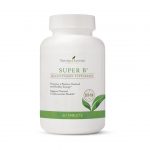There is some debate scientifically as to whether everyone should take a daily vitamin supplement. Although a daily supplement should never replace a well-balanced, healthy diet, there are many instances where supplements are of value.
Some research has shown that folic acid and B-complex vitamins may reduce the risk of stroke. Also, the Physicians’ Health Study II, published in 2012 by Harvard researchers, found that men who took a daily multivitamin for 11 years had an 8% lower risk of cancer and a 9% lower risk of cataracts compared with a placebo group.1
This article will focus on vitamin B complex, what it is, what it does, and who needs to take it.
What is a Vitamin B Complex Supplement?
A Vitamin B Complex supplement is comprised of eight B vitamins. They include the following:
- B-1 (thiamine)
- B-2 (riboflavin)
- B-3 (niacin)
- B-5 (pantothenic acid)
- B-6 (pyridoxine)
- B-7 (biotin)
- B-9 (folic acid)
- B-12 (cobalamin)
What Role Do B Vitamins Play in the Body?
This complex of vitamins is instrumental in a variety of important body functions. These functions include cell health, the development of red blood cells, healthy eye function, proper nerve function, muscle tone, hormone and cholesterol development, energy levels, and more.2 The role of B vitamins in the body is vast, affecting almost every organ system in the body. Clearly then, a deficiency of B vitamins can have a variety of consequences for the body.
B vitamins are water-soluble and are found naturally in meats, eggs, legumes, whole grains, seeds/nuts, and some fortified cereals. A water-soluble vitamin is one that is carried to the body’s tissues but is not stored. They are removed from the body in urine and will need to be replaced daily to maintain healthy levels. Vitamin C is the other water-soluble vitamin.
How To I Get B Vitamins Without a Supplement?
Food sources that contain B Vitamins include fish and shellfish, eggs, dairy, beef, liver, and chicken. Whole grains, legumes, seeds, and nutritional yeast also contain some levels of B vitamins.
Since animal products are the main natural source of B vitamins, a vegan diet may be a risk factor for Vitamin B deficiency. Other risk factors for deficiency result from disease states that impair absorption such as alcohol dependence, Crohn’s disease, ulcerative colitis, inflammatory bowel disease, HIV and certain kidney conditions.
Some common medications can also decrease the levels of B vitamins in your body. These medications are:
- Proton Pump Inhibitors (Prilosec, Prevacid, Protonix, Nexium, Dexilant)
- H2 receptor antagonists (Zantac, Pepcid, Tagamet, Axid)
- Metformin (Glucophage)
These are commonly used medications and chronic use should be considered a risk factor for Vitamin B deficiency.
The above risk factors should be considered if there are signs and symptoms that may indicate Vitamin B deficiency. People with vitamin B12 deficiency almost always need a supplement.1
What are the Signs of Vitamin B Deficiency?
Because the B vitamins play such a vast role throughout the body, it is clear that maintaining healthy levels is important. Being able to recognize the symptoms of Vitamin B deficiency and determining when supplementation is necessary is an important step towards overall health.
Because B vitamins work in so many ways throughout the body, interpreting the signs of deficiency can be difficult.
Symptoms of B Vitamin Deficiency May Include:
- Dry, scaly skin
- Fatigue
- Weakness
- Depression or irritability
- Nausea
- Anemia
- Numbness or tingling in the extremities
Because these symptoms can be vague and have other causes, it is important to see a doctor if you are experiencing any or some of these issues.
What Are the Long-Term Consequences of Vitamin B Deficiency?
Several health concerns can develop after a prolonged deficiency of Vitamin B:
- Anemia
- Peripheral neuropathy
- Neuropsychiatric disorders (particularly with Vitamin B12 deficiency)
- Digestive issues
- Skin conditions
- Increased birth defects in babies born to folic acid deficient mothers
So we now know what B vitamins are, what they do and who is at risk for deficiency. The next question is how to determine what supplement to take.
There are many different Vitamin B products available over-the-counter. B vitamin deficiency associated with diseases such as Chrohn’s disease and kidney disease should be treated by a physician with prescription products. For the rest of the population, choosing a commercial Vitamin B Complex product can be overwhelming. It is important to choose a product that is high-quality with a formulation that allows for maximum absorption so that your money isn’t literally being flushed down the toilet. Young Living’s Super B tablets are formulated with all eight of the B vitamins. They use a natural folate derived from lemon peels and a more bioavailable form of Vitamin B12 called methylcobalamin. This product also contains chelated minerals such as magnesium, manganese, selenium, and zinc to support mood, cardiovascular, and cognitive health.

1 https://www.health.harvard.edu/staying-healthy/do-you-need-a-daily-supplement
2 https://www.healthline.com/health/food-nutrition/vitamin-b-complex#benefits